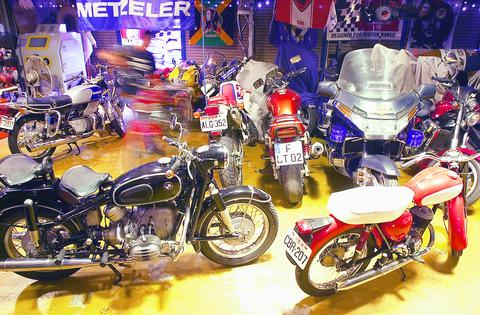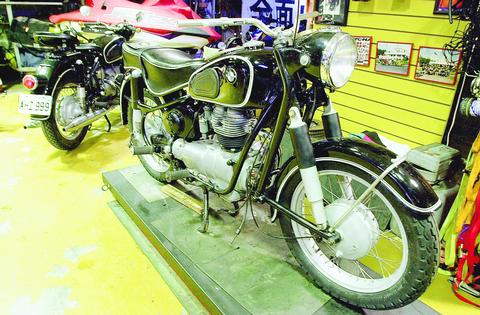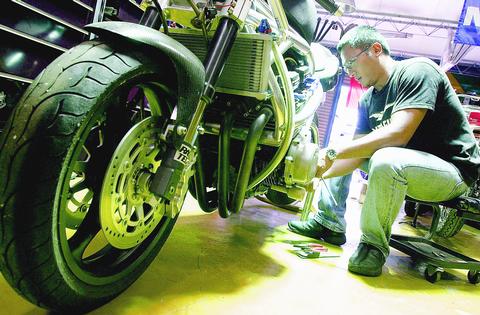For over a decade, motorcycle enthusiast Jack Wang (
The government outlawed the importation, use and registration of bikes larger then 125cc in 1982. Prior to this, people could import big bikes, register them at the Department of Motor Vehicles (DMV,

PHOTO: CHEN CHENG-CHANG, TAIPEI TIMES
The change in government policy may have resulted in a decrease in the number of big bikes driven on the roads, but it certainly did not see a sudden halt in imports of big bikes.

PHOTO: CHEN CHENG-CHANG, TAIPEI TIMES
Smugglers, especially those with connections to the Japanese underworld realized a lucrative trade could be had "importing" bikes that had been stolen off the streets in Japan. The surprisingly large number of local motorbike enthusiasts willing to pay significantly more than the original retail price for a stolen big bike has meant that, along with Hong Kong, Taiwan is one of the leading destinations for hot hogs in Asia.
Finding a loophole

PHOTO: CHEN CHENG-CHANG, TAIPEI TIMES
Of course, not all of the nation's big bike devotees are willing to flaunt the law to feed their passion. The change in the law forbade imports of complete big motorcycles, but imports of individual bike parts remained legal. Collectors and dealers with the ability to build a bike from its disassembled parts and with cash to burn have been importing motorcycles in this manner ever since.
"We get around the import restrictions by importing bikes in pieces," explains Sunny Wu (
Customs officials are fully aware of the loophole, but are powerless to impound motorcycle parts.
Customers who purchase bikes in this manner can pay upwards of 80 percent more than the original retail price for the bike of their dreams, which means big bikes such as a Honda Gold Wing can cost up to NT$2 million.
The huge price tag doesn't deter would-be easy riders. According to Wang, over 10,000 bikes have been imported in this manner since 1982 and the number will no doubt continue to rise until Taiwan formally enters the WTO after which the law restricting sales of big bikes would constitute a violation of trade regulations. Most anticipate a relaxing of the rules against riding big bikes once sales are permitted.
Regardless of the high prices paid by enthusiasts for big bikes, reassembled hogs currently cannot be legally taken for a spin. Owners must pay vehicle tax and register their bike with the DMV, yet it remains illegal for the bikes to be driven on public highways. The paying of the motor vehicle tax is intended simply to provide proof that the vehicle is not stolen. The DMV doesn't issue license plates for the bikes, though some imported prior to the ban in 1982 have license plates. Nonetheless, the bikes are still forbidden on the roads.
The eclectic group of big-bike owners -- some of whom are in the military and in the medical, legal and even political fields -- all keep a close eye out for traffic police whenever they slip their bikes out of the garage for a spin.
"Groups or riders cruise to Hualien nearly every weekend. It's the most popular destination because of the many mountain roads and the very few traffic police. It's never simply a case of just hitting the highway on a whim, though," states Wang. "Each trip has to be planned well in advance. The riders need to find out on which roads the cops are patrolling on that particular weekend, ensure hotels are booked in advance and that adequate and out-of-the-way parking is available."
Police don't actively track down and prosecute owners of big bikes, but if a big bike rider is pulled over he or she faces a hefty fine, regardless of whether the person can produce proof of having paid the vehicle tax.
If the owner can prove tax has been paid on the bike and that he or she has a valid motorcycle driver's license, the fines for riding a big bike on public highways range between NT$2,000 and NT$10,000. Without proof of having paid the vehicle tax the police can, and often do seize the motorbike as well as significantly ratchet up the fine.
Unlike seized cars and small two-stroke bikes under 125cc, confiscated big bikes aren't auctioned off. Instead, the million NT dollar dream machines are unceremoniously destroyed.
According to Wang, many groups of riders avoid problems with traffic cops simply by ensuring that at least one in their posse is a high-ranking police officer.
More precious than family
Since his cousin first turned him on to large bikes in the mid-1980s, Wang readily admits to having undertaken his fair share of illegal forays onto Taiwan's highways. He'll also acknowledge, albeit very modestly, that he has taken his bike up to 260kph.
At the same time, however, his love of big bikes isn't solely a need for speed or the urge to impress, as is the case with many local big bike owners, many of whom pay exorbitant prices for machines they cherish, but rarely ride.
"I know guys who treat their bikes better than their families. I mean, they even keep them in their bedrooms," Wang said. "Of course, they don't ride them, they polish them and that's about it. Crazy!"
Having been an avid big-bike enthusiast for over 10 years, Wang began to prepare for WTO entry in earnest in 1997. He realized that with entry into the international trade organization likely to take place within a few years, Taiwan would need mechanics and big bike specialists. So he traveled to Florida, where he enrolled at the American Motorcycle Institute, located adjacent to the Daytona Race Track. A year later Wang had graduated and became one of Taiwan's only AMI-certified mechanics.
Returning to Taiwan, Wang set about transforming a garage in northern Taipei into his own workshop and studio for big bikes.
Wang has yet to begin selling bikes, but has already been approached by British motorcycle manufacturing giant Triumph about representing the company in Taiwan.
"Triumph hopes to be one of the first motorcycle companies to capitalize on WTO entry. With the recent trend in retro-style scooters and bikes, Triumph hopes to build up interest in its classic range of bikes such as the twin-engine Bonneville -- a bike that first hit the road 60 years ago," Wang said. "This will hopefully be the first Triumph and one of the first big bikes to hit the market in Taiwan."
With retro scooters and old-style 125cc bikes now fashionable among the nation's younger generation, Wang expects considerable competition in the market for retro bikes. He nonetheless expects manufacturers like Suzuki, Honda, Yamaha and Kawasaki to make the most popular models in Taiwan in the short term.
"Obviously there's no easy-rider culture in Taiwan. For that reason, a lot of people are drawn toward Japanese racing bikes rather than US or European touring bikes," explains Wang. "Even though the Triumph Bonneville is expected to be priced around NT$300,000, which for a bike of 800cc is incredibly cheap, I think local people will remain attracted to the Japanese bikes during the initial period."
As general manager of Pro-Yoshimura, Peterson Hsueh (
Two-wheeled hazards?
The lifting of the ban on imports of big bikes may provide a windfall for Wang, but he nevertheless worries about hordes of inexperienced riders rushing out and purchasing ultra-powerful machines.
When he's not working in his garage Wang spends a considerable amount of time writing politicians regarding the need for caution on the lifting of the ban on riding big bikes.
"Obviously there has to be a law governing who and at what age people can ride big bikes," says Wang. "The traffic is bad enough without a bunch of idiots on big bikes making it worse and endangering their and other people's lives."
One way Wang attempts to ensure those who purchase big bikes do so for the right reasons is to do his own screening of customers before recommending a dealer. If Wang feels the individual's knowledge of the powerful machines is inadequate he'll tell the person to reconsider.
"If the person's knowledge of big bikes is minimal then I say politely that they are wasting their time, their money and possibly endangering their lives. Of course, they can always go elsewhere, but at least I've tried to stop fools from taking to the road," Wang said.
There are currently two motorcycle licenses, one for bikes under 100cc and another for bikes of 100cc and up. Wang hopes to ensure that the tests for big-bike licenses are sufficiently stringent.
"For what it's worth, the present national motorbike driving test is okay. But when you start getting people with extra money to burn riding 750cc bikes and who have only had experience on a 100cc bike without real training then you are asking for trouble," Wang said. "I hope the tests will be modeled after the Japanese ones, with an age limit and more than one test."
Japanese big-bike regulations are extremely strict and require written, oral and practical tests specific to certain models of bikes.
Thankfully, Wang's numerous calls for caution haven't fallen on deaf ears. His many letters to politicians have already elicited some reaction, though mostly of the verbal nature. Several of Taipei's driving test centers are looking into having Wang offer training to instructors and supervise special courses on big-bike tests.
For the time being, Wang already has his plate full in the coming months training young mechanics to meet the rise in demand for big bikes anticipated upon full entry into the WTO.
"I'm really happy about WTO entry," explains Hsueh. "Big bikes are going to be in big demand starting next year and it won't be a passing fad. The market in Taiwan is presently an underground one, but when it finally becomes legal to ride big bikes here you'll see just how hugely popular they are."

May 26 to June 1 When the Qing Dynasty first took control over many parts of Taiwan in 1684, it roughly continued the Kingdom of Tungning’s administrative borders (see below), setting up one prefecture and three counties. The actual area of control covered today’s Chiayi, Tainan and Kaohsiung. The administrative center was in Taiwan Prefecture, in today’s Tainan. But as Han settlement expanded and due to rebellions and other international incidents, the administrative units became more complex. By the time Taiwan became a province of the Qing in 1887, there were three prefectures, eleven counties, three subprefectures and one directly-administered prefecture, with

It’s an enormous dome of colorful glass, something between the Sistine Chapel and a Marc Chagall fresco. And yet, it’s just a subway station. Formosa Boulevard is the heart of Kaohsiung’s mass transit system. In metro terms, it’s modest: the only transfer station in a network with just two lines. But it’s a landmark nonetheless: a civic space that serves as much more than a point of transit. On a hot Sunday, the corridors and vast halls are filled with a market selling everything from second-hand clothes to toys and house decorations. It’s just one of the many events the station hosts,

Two moves show Taichung Mayor Lu Shiow-yen (盧秀燕) is gunning for Chinese Nationalist Party (KMT) party chair and the 2028 presidential election. Technically, these are not yet “officially” official, but by the rules of Taiwan politics, she is now on the dance floor. Earlier this month Lu confirmed in an interview in Japan’s Nikkei that she was considering running for KMT chair. This is not new news, but according to reports from her camp she previously was still considering the case for and against running. By choosing a respected, international news outlet, she declared it to the world. While the outside world

Through art and storytelling, La Benida Hui empowers children to become environmental heroes, using everything from SpongeBob to microorganisms to reimagine their relationship with nature. “I tell the students that they have superpowers. It needs to be emphasized that their choices can make a difference,” says Hui, an environmental artist and education specialist. For her second year as Badou Elementary’s artist in residence, Hui leads creative lessons on environmental protection, where students reflect on their relationship with nature and transform beach waste into artworks. Standing in lush green hills overlooking the ocean with land extending into the intertidal zone, the school in Keelung